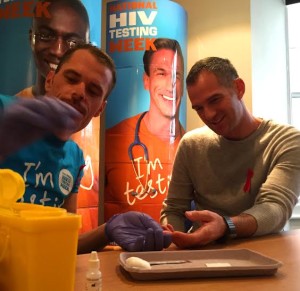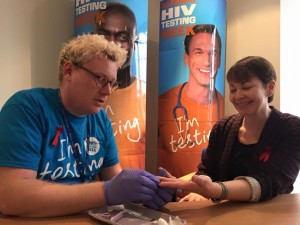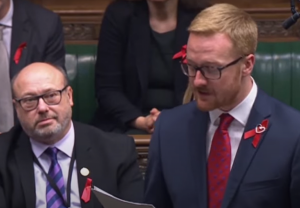Brighton and Hove could help lead the way in eradicating new cases of HIV with a pilot project aimed at extending community testing.
The aim would be to catch cases early, when treatment tends to be more effective and cheaper, and to eliminate new cases within 10 years.
The three MPs for Brighton and Hove – Caroline Lucas, Peter Kyle and Lloyd Russell-Moyle – and council leader Phélim Mac Cafferty wrote to Health Minister Jo Churchill.
She is responsible for prevention, public health and primary care.
The MPs’ and council leader’s letter proposed that Brighton and Hove should be a pilot city for a new HIV testing regime which would normalise HIV testing in the community.
They welcomed the encouraging response from the minister who said that she had asked Department of Health officials to look at the offer.
She said that she was keen to work with areas like Brighton and Hove to learn from its pioneering approach to prevention, testing and reducing late diagnosis of HIV.
Now, the MPs and council leader plan to invite her to the city to see what is being done locally to reduce HIV infection.
They believe that Brighton and Hove is the perfect place for a pilot project because it has some of the best online testing services in the country.
And it was the first place in Britain to have “HIV Fast-Track City” status – aimed at eliminating new HIV infections and AIDS-related deaths.
Brighton and Hove also pioneered HIV test vending machines and has supported a number of other community testing initiatives, including National HIV Testing Week.
Current plans include extending HIV testing even further, making it available when people go to the hospital Accident and Emergency (A&E) Department, register for a new GP and in local pharmacies.
Yesterday, a Brighton and Hove City Council sub-committee approved the commissioning of a new contract worth up to £2 million to provide sexual health, HIV prevention and social care services.

Councillors authorised a three-year contract, with the prospect of a two-year extension, for the service which is currently provided by the Terence Higgins Trust for just over £410,000 a year.
A report to the council’s Adult Social Care and Public Health Sub-Committee said: “There is a high burden of poor sexual health in Brighton and Hove with the 17th highest rate of new sexually transmitted infections (STIs) of local authorities in England and the highest rates in the south east region.
“Gay and other men who have sex with men (MSM), younger people under 25 and those with a black ethnicity have been statistically shown to be at the highest risk of STIs.
“Brighton and Hove has the 8th highest prevalence of diagnosed HIV in England and the highest outside of London.
“In 2019 the prevalence was 7.94/1,000 aged 15-59 compared to 2.39/1,000 in England.
“The vast majority (84 per cent) of people (92 per cent of males) probably acquired the infection through sex between men (while) 85 per cent of people living with HIV in Brighton and Hove are white but over half of women living with HIV locally have a black ethnicity.

“Evidence-based HIV prevention and social care for people living with HIV makes good public health and economic sense.
“Every HIV infection that is prevented benefits individual and public health and saves the state around £280,000.”
The Green MP for Brighton Pavilion, Caroline Lucas, said after the Health Minister’s response: “Our city is a national leader in driving down HIV infections, not least because MPs, the council and local public health teams have worked together on this.
“We want to share our experiences with others and we’re also ready to do more.
“I’m glad the minister seems prepared to work with us towards ending new cases of HIV by 2030 in England.”
Councillor Phélim Mac Cafferty, the Green leader of the council, said: “Outstanding progress has already been made in the city to increase testing and fight HIV-related stigma.
“This is typified by the recent installation of a vending machine with free STI tests in the Jubilee Library.

“Normalising HIV testing across health services is the next step. We are eager to get this pilot under way as we know Brighton and Hove is well placed to be one of the first cities to make it happen.
“That’s because in addition to strong continued commitment to support people living with HIV, we are proud to be the host of some of the best HIV support, treatment, and prevention services and community organisations in the country.
“They’ve been running for many years and working in strong collaboration with our communities and public health teams.
“An important next step in supporting our communities is to achieve our shared aims for zero HIV infections, zero HIV stigma and zero HIV-related deaths.”
Roz Scott is a freelance journalist. To read more of her work or subscribe to her blog, visit www.rozscott.com.








